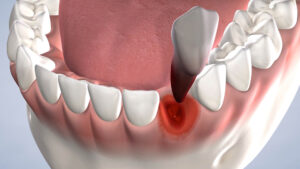
Adult teeth are meant to last for the remainder of our lives. However, situations like dental trauma, infection, or disease may cause irreparable damage to a tooth, leaving extraction the only option. Dr. Salin, Dr. Weiner, Dr. Semanoff, Dr. Nack, and Dr. Kosakowski perform quick and comfortable tooth extractions to relieve you from tooth pain and improve your oral health. Contact our office in Feasterville, Newtown, or Abington, PA, if you need a tooth extracted or wish to explore your tooth replacement options.
As dental experts, we make every effort to save your natural teeth. Root canal therapy, fillings, and crowns can repair teeth in many instances. When a tooth is badly broken or decayed, however, it may be beyond the point of saving. Extracting these teeth protects the health of other teeth by preventing infection from spreading. Tooth extraction also relieves tooth pain immediately if the damage or infection is causing discomfort.
Other reasons why a tooth may need to be extracted includes:
Prior to having a tooth extracted, you will meet with one of our board-certified oral surgeons who will examine your oral health. We may take 3D scans of your mouth to evaluate your facial structures and detect any hidden issues. In some cases, we can perform tooth extraction on the same day as the consultation.
As oral surgery experts, we offer a variety of anesthesia and sedation options for your comfort. Many patients only require local anesthesia for tooth extraction, which is administered through a syringe and numbs the area.
Your surgeon will use forceps to gently extract the tooth. You may feel some pressure, but the anesthesia will numb the area to prevent you from feeling pain. After the tooth is removed, we will place gauze in your mouth and provide you with instructions to manage swelling, bleeding, and oral hygiene while your mouth heals.
If you are receiving a same-day dental implant, we will insert the implant immediately following extraction. Same-day implants prevent you from having to go without a tooth and eliminate the need for a second surgical visit to insert the implant. As long as there is sufficient jaw bone to support the implant, you likely qualify for a same-day implant. During your first visit, we will discuss your tooth replacement options to see if dental implants are right for your smile.
After having a tooth removed, there are several options to consider for restoring the tooth. We will outline all of these options with you and help you select the right choice for your oral health.
We offer a variety of choices to ensure a comfortable oral surgery experience.
If you have a painful tooth, have experienced dental trauma, or have been referred for tooth extraction, contact Innovative Oral Surgery & Dental Implants to schedule an appointment. We will explore your treatment options and ensure you have a comfortable and seamless oral surgery experience. Our board-certified surgeons perform tooth extractions at each of our offices in Feasterville-Trevose, Newtown, and Abington, PA.
1300 Bridgetown Pike
Feasterville-Trevose, PA 19053
We Proudly Serve:
638 Newtown Yardley Rd #2A
Newtown, PA 18940
We Proudly Serve:
1494 Old York Road #2
Abington, PA 19001
We Proudly Serve:
These patients can tell you about their firsthand experience undergoing tooth extraction at our office.
For over 50 years, we have had the privilege of serving our communities with the highest level of oral surgery care. We love what we do, and we look forward to providing you and your loved ones with an outstanding patient experience and incredible results.
Administered through a syringe, a local anesthetic numbs only the surgical site. The effects can last up to several hours. We often pair local anesthesia with another type of anesthesia or sedation.
Commonly known as laughing gas, nitrous oxide is inhaled through a mask. It provides mild sedation and pain relief and is often combined with other options, such as oral sedation, for optimal effect.
General anesthesia will render you totally unconscious. This option is reserved for complex surgeries such as orthognathic surgery or facial reconstruction.
Your surgeon will inject the sedative into the vein, which will render you into a semi-conscious state. Also called twilight sedation or twilight dentistry, this option is ideal for extensive procedures or highly anxious patients.